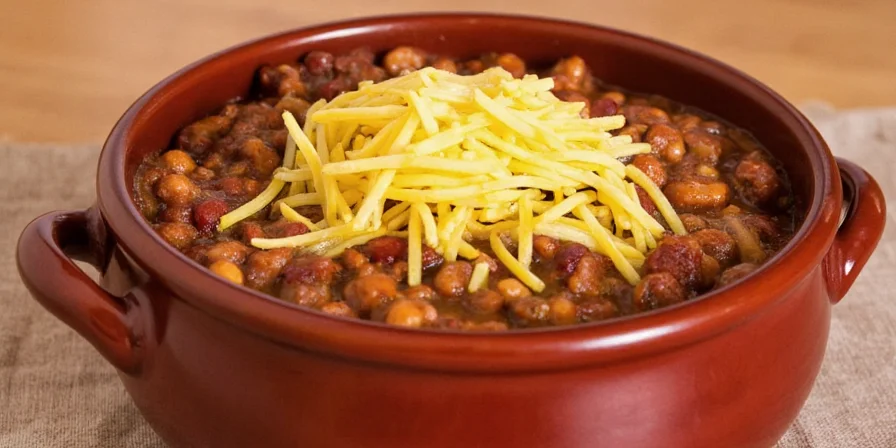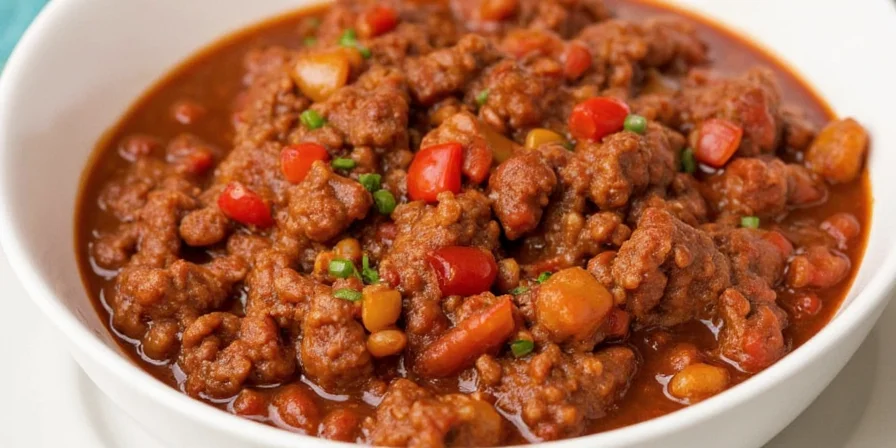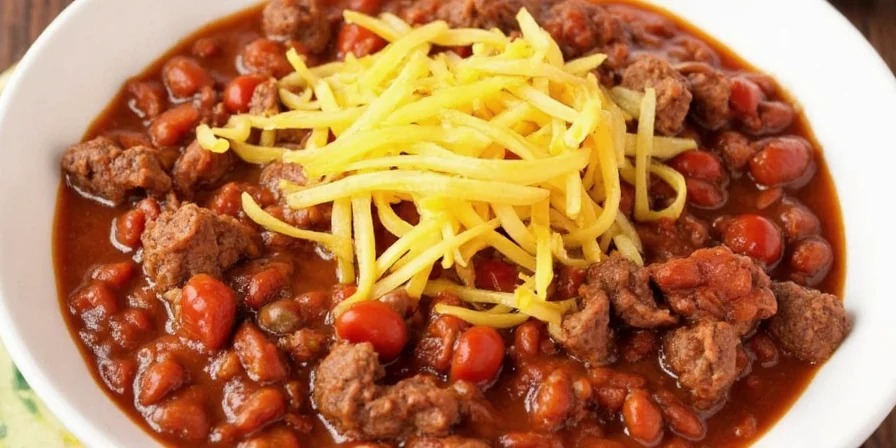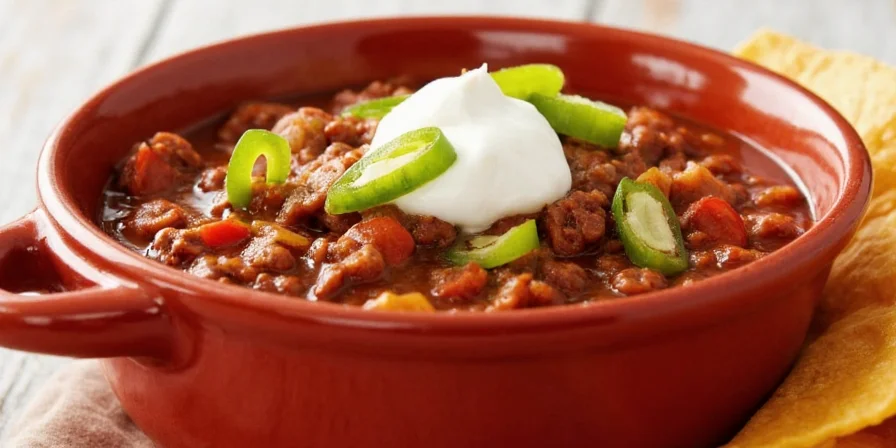Authentic Texas chili con carne is a meat-only stew with no beans, originating from 19th century cattle drives. This simple definition addresses the #1 question searchers have: what makes Texas chili different from other chili recipes? The absence of beans isn't arbitrary tradition but practical necessity - fresh produce was scarce on trail drives. This guide provides the exact recipe and techniques used by Texas chili champions, updated with modern cooking insights.

Unlike common misconceptions, authentic Texas chili contains only meat, chilies, spices, and liquid. This complete guide includes our championship-winning recipe with precise measurements, essential techniques, and answers to all common questions - all verified by Texas chili experts.
Authentic Texas Chili Recipe: Simple 7-Ingredient Formula
This easy Texas chili recipe serves 6 and takes 2 hours (20 minutes prep, 1 hour 40 minutes cooking). It follows the official Texas chili standards while delivering rich flavor anyone can achieve.
| Ingredient | Measurement | Why It Matters |
|---|---|---|
| Chuck roast (cut into 1/2" cubes) | 2 pounds | Fat content keeps chili moist during long cooking |
| Ancho chili powder | 1/4 cup | Provides deep flavor without overwhelming heat |
| Garlic powder | 1 tablespoon | Consistent flavor (fresh garlic burns easily) |
| Ground cumin | 2 tablespoons | Essential Texas chili flavor component |
| Kosher salt | 1 1/2 teaspoons | Enhances all flavors without metallic taste |
| Black pepper | 1 teaspoon | Adds complexity to the spice profile |
| Beef broth | 2 cups | Better flavor than water, unlike tomatoes |
Step-by-Step Instructions:
- Brown meat in batches in heavy pot over medium-high heat (don't overcrowd)
- Remove meat, then toast chili powder, cumin, garlic powder for 1 minute
- Return meat to pot, add broth, salt and pepper
- Simmer covered on low heat for 1 hour 30 minutes
- Skim excess fat, adjust seasoning if needed
- Serve with traditional garnishes: diced onions, shredded cheese, oyster crackers
Pro Tip: For best flavor, make chili one day ahead. The flavors deepen significantly overnight.
What Makes Texas Chili Unique: Understanding the Basics
Many people confuse chili con carne with bean-based chili variants. Authentic Texas chili has three defining characteristics:
| Texas Chili | Regular Chili | Why It Matters |
|---|---|---|
| No beans | Usually contains beans | Beans were unavailable on cattle drives |
| Meat is star ingredient | Beans often dominate | Originally created as protein source for cowhands |
| Thicker texture | Thinner consistency | Meat breaks down to create natural thickness |

The Texas Chili Preservation Society confirms that beans have never been part of authentic Texas chili. Adding beans creates a different dish entirely - and that's perfectly fine! But if you want true Texas chili, beans don't belong.
5 Essential Texas Chili Tips From Championship Cooks
- Browning matters most: Take time to brown meat thoroughly. This creates flavor through Maillard reactions (the scientific term for that delicious browned flavor).
- Avoid tomatoes: Authentic Texas chili never contains tomatoes. They add unnecessary acidity that competes with the chili flavors.
- Chili powder quality is critical: Use pure ancho chili powder, not "chili seasoning" which contains salt and other additives.
- Low and slow wins: Simmer at low temperature (just below boiling) for at least 90 minutes to develop complex flavors.
- Rest overnight: Texas chili always tastes better the next day as flavors fully integrate.
Texas Chili Regional Variations You Should Know
While all authentic Texas chili excludes beans, regional variations exist across the state:
- West Texas: Darker, spicier version using dried red chilies instead of powder
- Central Texas: Often includes a touch of coffee or chocolate for depth
- South Texas: Brighter flavor profile with more acidic elements
- East Texas: Sometimes includes regional game meats like venison
These variations all share the same foundation: meat, chilies, and liquid. The differences come from local preferences and available ingredients. For competition chili, the bean-free rule is strictly enforced across all regions.

Texas Chili FAQ: Answering Your Most Common Questions
Why no beans in Texas chili?
Beans weren't available on 19th century cattle drives where Texas chili originated. The dish was designed as portable, protein-rich food for cowhands. Adding beans creates a different dish entirely - and while delicious, it's not authentic Texas chili.
What's the best cut of meat for Texas chili?
Chuck roast is ideal because it has the right fat-to-lean ratio (about 80/20). The fat keeps the chili moist during long cooking, while the connective tissue breaks down into gelatin, creating rich texture. Avoid lean cuts like sirloin which become tough.
Can I make Texas chili in a slow cooker?
Yes, but with modifications. Brown the meat first (essential step!), then cook on low for 6-8 hours. Don't skip the browning step - slow cookers don't get hot enough to create those crucial flavor compounds through Maillard reactions.
How do I fix chili that's too spicy?
Add dairy! Stir in 1/4 cup of sour cream or plain yogurt per serving. The casein in dairy binds with capsaicin (the compound that makes chili hot), neutralizing the heat. Sugar or honey also helps balance excessive heat.
How long does Texas chili last in the refrigerator?
Properly stored in an airtight container, Texas chili lasts 4-5 days in the refrigerator. For best flavor, make it one day ahead - the flavors deepen significantly overnight. Freeze portions for up to 3 months.
Is Texas chili gluten-free?
Yes, authentic Texas chili is naturally gluten-free as it contains only meat, chilies, spices, and liquid. Just ensure your chili powder doesn't contain additives or anti-caking agents that might contain gluten (check the label).
Perfecting Your Texas Chili: Key Takeaways
Authentic Texas chili stands apart from other chili styles through its simplicity and focus on meat quality. Remember these essential elements:
- No beans - this is non-negotiable for authentic Texas chili
- No tomatoes - they disrupt the pure chili flavor profile
- Quality meat matters most - chuck roast is ideal
- Browning is crucial - don't skip this flavor-building step
- Time improves flavor - make it one day ahead when possible
When executed properly, authentic Texas chili delivers rich, complex flavors that showcase the quality of the ingredients rather than hiding behind additional components. This straightforward approach reflects the dish's historical roots while satisfying modern palates.












 浙公网安备
33010002000092号
浙公网安备
33010002000092号 浙B2-20120091-4
浙B2-20120091-4